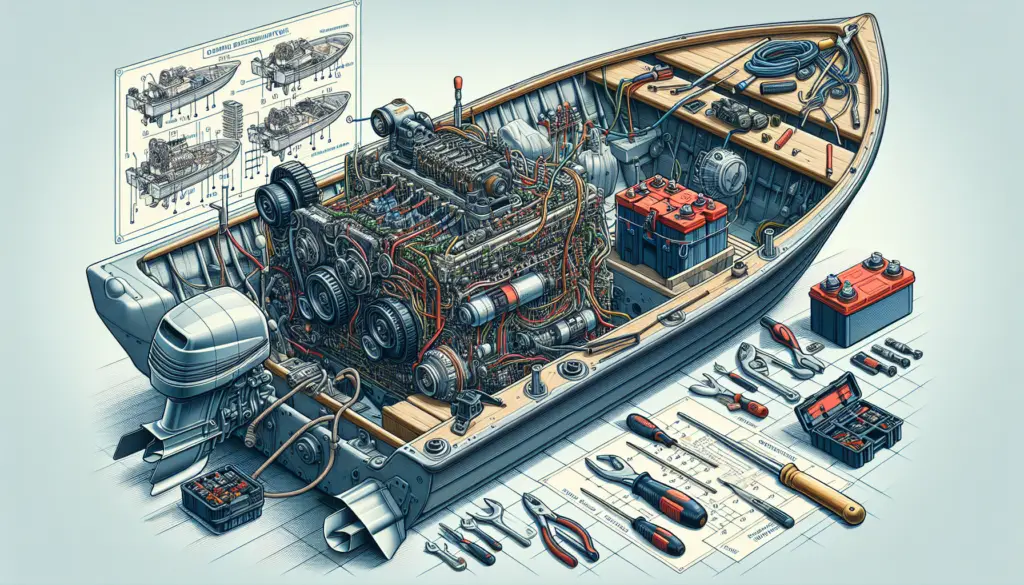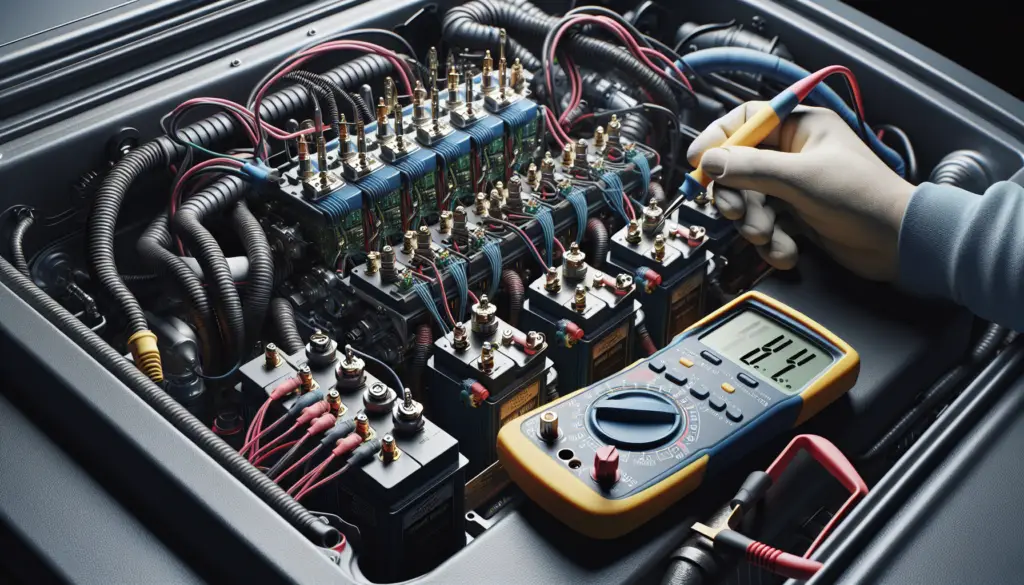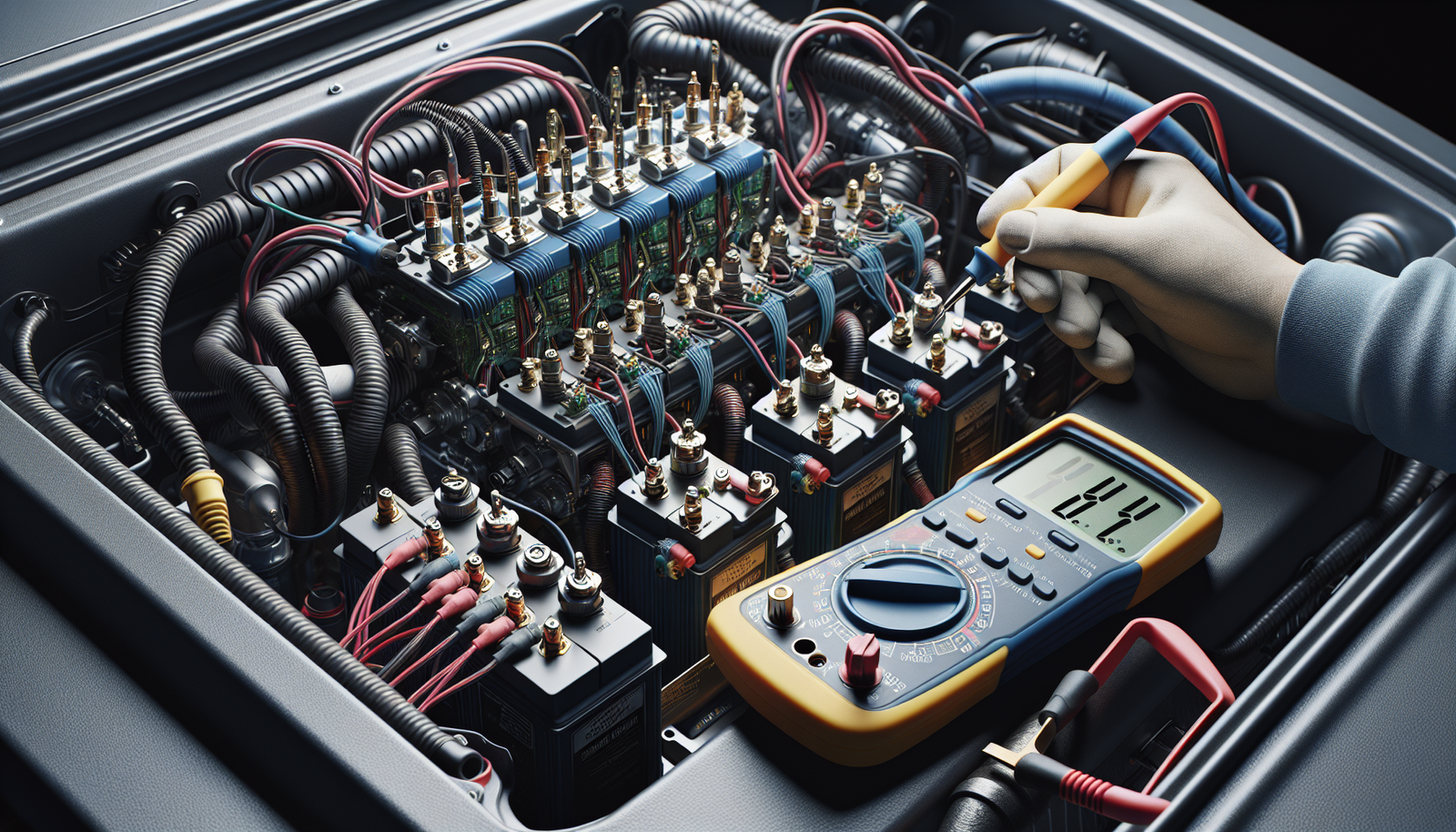Whether you’re a seasoned boat owner or a novice mariner, knowing how to maintain and service the electrical system of your boat’s engine is a crucial piece of knowledge every boat enthusiast should have. In the following article, you’ll get valuable insights and expert advice on the nitty-gritty of proper care and maintenance for your boat engine’s electrical system. From routine checks to detect possible faults early, to preventive measures and emergency solutions– this guide is all you need to ensure your engine’s electrical system stays in shipshape condition, saving you from unnerving situations and potentially hefty repair bills.

Understanding the Basics of Your Boat’s Electrical System
Before you can properly service and maintain your boat’s electrical system, you first need to understand the basics of how it works. The electrical system of your boat is a complex network that powers everything from your navigational equipment to your boat’s engine.
Knowing the components of the electrical system
Driving the mechanics of this network is a number of vital components. These include your boat’s battery system, the alternator, a voltage regulator, and a myriad of fuses and circuit breakers. All play their own unique role in your boat’s electrical process and require your regular attention.
Comprehending how electricity works in a marine environment
In a marine environment, the principles of electricity work a little differently than on land. The presence of water and salt can have damaging effects on electrical systems. Too much moisture can lead to corrosion, while salty sea air can cause parts to rust or fail.
Importance of electrical system in a boat
The electrical system in a boat is crucial as it provides power for navigation, communication, and comfort equipment, besides starting the engine. Without it, not only would your comfort be severely impacted, but your safety on the waters could also be at risk.
Familiarizing Yourself with the Boat Engine Electrical System
Now that you understand the basics, let’s take a closer look at some of the pieces that make up your boat’s electrical system and learn about what they do.
Identifying the alternator
The alternator is a vital part of your boat’s electrical system. It’s essentially a generator that converts mechanical energy into electrical energy. While the engine is running, the alternator produces electricity to power your boat’s systems and recharge your batteries.
Understanding the battery system
The battery is essentially the heart of your boat’s electrical system. It supplies power to all the electrical devices on your boat when the engine isn’t running. Regular inspection and proper maintenance of the battery is necessary to ensure it operates smoothly.
Knowing the function of the voltage regulator
The voltage regulator safeguards your electrical system by controlling the output of the alternator. It prevents the batteries from overcharging, which can be as damageable as undercharging them.
Role of fuses and breakers
Fuses and breakers act as the safety guards of your boat’s electrical system. They protect your boat’s wiring by breaking the electrical circuit if it exceeds a safe level of electricity, preventing damage and possible fires.
Routine Inspection Procedures
To maintain the efficiency and longevity of your boat’s electrical system, it’s essential to carry out regular inspections.
Checking for corroded or loose connections
Every now and then, make sure all electrical connections are secure and free of corrosion. Corrosion can limit the flow of electricity and even cause system failure if not properly addressed.
Inspecting the alternator belt
The alternator belt is crucial to your alternator’s operation. Regularly inspect the belt for any signs of wear, damage, or looseness.
Examining the battery cables & terminals
Regular battery checks are a must. This includes detailed inspections of the battery cables and terminals for signs of wear or corrosion.
Looking at the fuses and breakers
Assessing your fuses and breakers is necessary to prevent electrical system issues. Occasionally take the time to inspect these parts and replace them as necessary.
Proper Cleaning Techniques for Boat Electrical System Components
Routine cleaning of your boat’s electrical components can greatly improve its overall performance and longevity. Here’s how.
Cleaning the battery terminals
Cleaning the battery terminals is relatively easy and requires minimal equipment. Simply use a wire brush to clean off any corrosion and then reattach the cables.
Washing the alternator
Normally, alternators don’t require much cleaning. But if your alternator is dirty or greasy, a quick rinse with an automotive grade cleaner should do the job.
Maintaining the fuses and breakers
When cleaning fuses and breakers, avoid using water. Instead, use compressed air to clean out any dust or debris.

Testing Your Boat’s Electrical System
One of the main aspects of maintenance is testing. This allows you to catch potential problems early and avoid unnecessary repairs or replacements.
Using a multimeter for testing
A multimeter is a handy tool that lets you test electrical values. You can use it to check values like voltage, resistance and continuity, to ensure your boat’s electrical system is functioning properly.
How to test the battery
A lot of boat owners recommend testing the battery under load. This involves turning on a number of devices and appliances on your boat and seeing how your battery holds up.
How to test the alternator
Testing the alternator is crucial to guarantee your boat’s electrical efficiency. If the alternator isn’t functioning properly, it may put added strain on your battery.
Checking the fuses and breakers
Testing your fuses and breakers may be as easy as flipping a switch. If a breaker trips frequently or a new fuse blows right away, there could be a larger issue with your electrical system.
Maintaining the Battery System
The healthier your battery, the smoother your boat’s operations. Regular and proper maintenance can go a long way.
Regular charging of the battery
To extend the life of your battery, be sure to charge it regularly. Also, avoid allowing your battery to deplete of charge completely.
Safe storage tips
Storing your battery in a cool, dry place will help to maximize its lifespan. If you’re winterizing your boat, consider removing the battery and storing it safely indoors.
How to increase battery lifespan
To increase your battery’s lifespan, keep it clean, securely mounted, fully charged, and protected from extreme temperatures.
When to replace a battery
If your battery is struggling to hold a charge, it may be time to consider replacing it. You don’t want to wait until it’s too late and you’re stranded out on the water.
Maintaining the Alternator
Your alternator is responsible for keeping your battery charged. It’s important to keep it in good shape.
Regular inspection
Consistent inspections of your alternator are key to keeping it running efficiently. Look for any visible signs of damage, wear and loose connections.
Tips for cleaning
When it comes to cleaning your alternator, it’s usually more about preventing dirt, dust, and debris from building up in the first place. A can of compressed air can do wonders for this.
When to replace an alternator
If you’re having issues with your boat’s battery consistently dying or the boat’s appliances dimming and brightening, it may be time to consider replacing your alternator.
Importance of Regular Diagnosis and Repairs
Regular diagnostics and repairs are a way of taking proactive report of your boat’s electrical system.
Keeping the system efficient
Consistent diagnostics and necessary repairs help you keep your boat’s electrical system efficient, reliable, and safe.
Preventing major electrical faults
With regular checks and proper maintenance, you can detect minor faults earlier and prevent them from becoming major issues.
Extending the life of the boat engine
A healthy electrical system not only ensures your comfort and safety but also extends the life of your boat engine by ensuring it receives a consistent and reliable source of power.
Upgrading Your Boat’s Electrical System
Over time, you might need to upgrade your boat’s electrical system to accommodate additional equipment, or to increase efficiency and safety.
When to consider an upgrade
If your current system is struggling to power all of your appliances, or if you’re frequently experiencing electrical issues, it might be time to consider an upgrade.
Most common upgrades for boat electrical systems
Upgrades could include anything from adding an extra battery for more power, to installing a larger alternator, or upgrading your circuit breakers and cabling to safely handle a higher electrical load.
How to safely upgrade your system
Safety should always come first when upgrading your electrical system. Do your homework, consult experts if necessary, and take all precautions to avoid accidents.
Professional Servicing and Maintenance
While DIY maintenance and servicing are possible, there are times when you may require the expertise of a professional.
Benefits of professional servicing
Professional servicing ensures your boat’s electrical system is inspected, maintained, and repaired by experts. They have experience and knowledge to find and fix problems you might otherwise miss.
How often professional servicing should be undertaken
While frequency of professional servicing may depend on your boat’s usage and condition, an annual checkup is recommended for most boats.
Choosing the right service provider
Always go for a reliable and reputable service provider with a track record of excellence in servicing boat electrical systems. Make sure they understand the value of your boat and respect your investment.
So there you have it – understanding and maintaining your boat’s electrical system is not as daunting as it sounds. With a little bit of effort, you can keep your boat running smoothly and your time on the water trouble-free.

